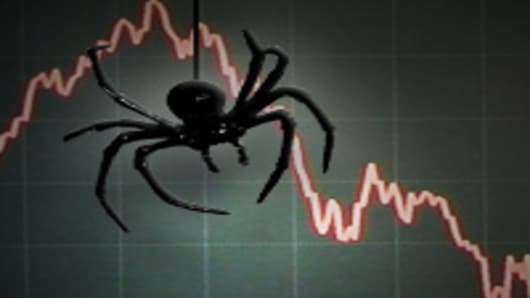Technical factors played a role in Thursday's unsettling market moves, including the disorderly across-the-board collapse in the price of risk assets in the final hour of trading and the related surge in U.S. Treasurys. But they were not the cause. Rather, they amplified three factors that will determine the fate of markets in the weeks ahead.
First, it is now undeniable that the U.S. economy is weakening across the board — a phenomenon aggravated by a concurrent slowdown elsewhere in the world.
Obviously, this translates into lower corporate earnings and profits. It also put pressures on the unfortunate households already burdened by un- and under-employment, excessive debt, and upside down mortgages.
Then there is the QE2 hangover. In aggressively using its balance sheet, the Fed's intention was to push asset prices higher and, by making individuals feel richer, encourage household spending and company investment.
The Fed delivered higher asset prices but these did not translate into a sustained increase in economic activity. Rather than the economy legitimizing liquidity-induced price increases, the Fed-created gap between market valuations and economic fundamentals is now being closed
through lower prices.
The second factor relates to confidence. Markets are worried that policymakers will not be able to put the economy back on the path of high growth and proper job creation.
Already there were worries about Washington running out of bullets when it comes to effective policy measures. These worries have been hugely amplified in the last two weeks by the stunning political dysfunctionality exposed by the debt ceiling debacle.
And then there is Europe, the third factor. By failing to act decisively, policymakers have allowed the Euro-zone's crisis to morph from the outer periphery (Greece, Ireland and Portugal) to also include much larger (and, therefore, harder to solve) countries (Italy and Spain), as well as the continent's banking system.
These three issues need to be addressed if markets are to regain and maintain their composure. This will require much better economic policies in both America and Europe.
We should not underestimate the markets' ability to recover if, for once, policymakers were to surprise on the upside. After all, there is lots of cash on the sidelines and most large companies (particularly multinationals) have impressive rock-solid balance sheets.
If, however, policymakers continue to disappoint, markets are staring at the regrettable prospects over the next few weeks of continued volatility and further losses.
Mohamed A. El-Erian is CEO and co-CIO of PIMCO, and author of "When Markets Collide".
He will be a guest on Squawk Box at 8:40 am ET on Friday.


